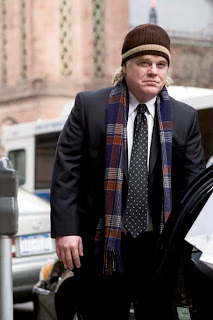When I'm sleepy I sometimes find my shoulders slumping forwards. I'm sitting at my desk and when I look up, my hands are clutching the sides of my chair to keep myself from falling forward into my laptop. It was exactly this posture in which Joyce Kinney sat throughout her extended interviews, which form the centrepiece of Errol Morris' new film: Tabloid. It's called Tabloid and not Joyce Kinney because the film is about the story of this woman's life, not about the woman herself. Which is probably why she looks so Atlas-y, so tired.
Joyce Kinney has had a very strange life. She kidnapped a Mormon. She upstaged Joan Collins at the premiere of The Stud. She jumped parole dressed as a nun. She had her dog cloned, for $150,000.
Where did she get the money? I don't know.
Did she actually kidnap Kirk the Mormon? Did he go willingly? Was it a bit of both? Don't know either.
The movie is not begging us to buy into any of the three hypotheses which it poses in its opening interview. Which is nice. Perhaps though it is not quite as anti-didactic as it seems to attempt. We cannot help but feel sad for Joyce. She lost the love of her life, whether by fault or misfortune. Maybe inescapable I guess.
And still, the film is full of laughter. Which I think is a strange and imaginative touch from Morris. We are used to his haywire, colourful, collages. The constant gurgling and giggling of the talking heads as they dissect the peculiar tragedies of Joyce Kinney's life add a wierd, Gilliam-esque, macabre to the piece. I like it a lot.
One thing that jumps out is the retreat which Joyce makes, immediately after her brief flirtation with fame. The symmetry is quite astounding. She emerges from rural isolation into the real world; the real world she experiences is a complete catastrophe; she retreats back into rural isolation. Wierd.
Another thing, that I did think about when I was coming to the end of the film was the way that Joyce's parents (or father at least) surfaced and then dissappeared again. It doesn't constitute a loose end, but it made me feel a bit stray, a bit strange. It just made me think that somewhere there, without it being noteworthy, Joyce was orphaned and that she will orphan nobody and that that seems such a thickset footnote.
Sunday, 4 December 2011
Philip Goes Directing
When I arrived at the screening place in Soho to watch this movie, I found a dusty old frontage with a dog weeing on the front doorstep. I mopped at the window with my cuff and peered inside. There sat the seats, there was the screen, tattered and torn. I felt an icy hand on my shoulder and turned to find an elderly gent.
“There hasn’t been a cinema there for fifty years.” He said. I realized that I had been caught in some kind of time-warp.
Excellent, I thought, this is the perfect place to watch (have watched?) a movie which is about time: about the unnerving passage of time; about the aggressive qualities of time; about the occasional and almost (almost) supernatural layering of present and future.
Hoffman has said that, simply, this film is about the admission that “if I fall in love with you, I need to be prepared for pain.” This is a peculiarly Calvinist statement. Beneath it lie that deeply Calvinist rhythm: the “doom, doom, doom” of a big bass drum.
Jack is a guy who lives in the future. This is a point which Hoffman hammers home a little too determinedly, but its an interesting point, so we’ll forgive him for it. Jack spends the whole film waiting for summer, waiting to be able to swim, waiting to be able to cook the perfect soufflé for his date. Jack’s done so much waiting that he’s found himself old, when he was once young. The action of the film is set in a period in Jack’s life when the future starts invading the present.
Good things come towards him, out of the future: The girl who he’s waiting for, steps up the pace. The job that he’s waiting for, lands on his doorstep. But bad things come out of the future also: He has a very intelligently staged vision of the relationship that lies ahead of him; the perfect, future, soufflé which lies in the future, emerges from the oven burnt to a crisp. Jack reacts badly. The brilliant climax has the idea of rape (the most potent and immediate occasion of future invading present) being tamed by a triumphant Jack.
It’s all handled with a fair amount of aplomb. Hoffman shambles through the film with his typical charm and charisma. There are some concerns about the romanticism of his image of working class life in America. But this is a movie of pulsing, absorbing rhythms, which draws you in and spits you out, once every twenty minutes or so. It is an excellent debut. It is a grand idea, masked with humility and cosiness. Which we like.
Subscribe to:
Comments (Atom)


